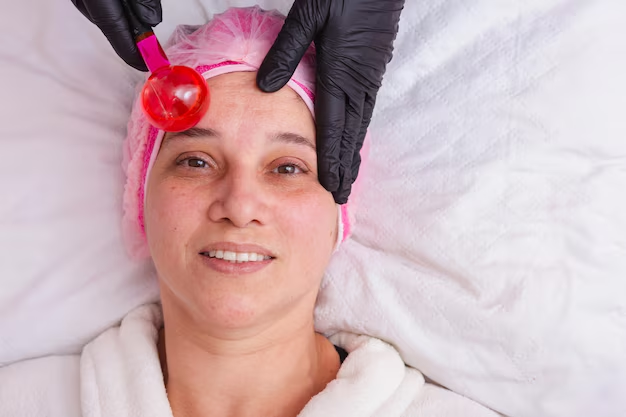Managing Rosacea: Effective Strategies for Calmer Skin
For those experiencing rosacea, the journey to manage this chronic skin condition can feel overwhelming. Its unpredictable flare-ups, characterized by facial redness and sometimes acne-like bumps, can significantly impact one's confidence and quality of life. Fortunately, understanding what helps rosacea can provide a roadmap to calmer, more comfortable skin. Here, we explore practical strategies to manage rosacea effectively.
Understanding Rosacea: The Basics
Managing rosacea begins with a solid understanding of the condition. Rosacea is a chronic inflammatory skin disorder that often affects the face, causing redness and visible blood vessels. While it primarily appears on the cheeks and nose, it can also extend to the forehead and chin. Rosacea can vary widely in severity, with some people experiencing mild redness and others developing more severe symptoms, including skin thickening and eye irritation.
Common Triggers
One of the key strategies in managing rosacea is identifying and avoiding common triggers. These vary among individuals but often include:
- Sun Exposure: UV rays can provoke skin inflammation, making sunscreen an essential part of a daily routine.
- Stress: Psychological and physical stress can exacerbate symptoms.
- Dietary Factors: Spicy foods, hot beverages, and alcohol, particularly red wine, are frequent culprits.
- Weather Extremes: Both hot and cold weather can trigger flare-ups.
- Skincare Products: Some products contain irritating ingredients such as alcohol or fragrances.
The Importance of Personal Awareness
Because triggers are personal, keeping a rosacea diary can be invaluable. Documenting daily activities, foods, and product usage helps identify patterns over time, allowing for more informed decisions about lifestyle adjustments.
Skincare Regimen for Rosacea
A gentle and consistent skincare routine is crucial for managing rosacea effectively. The goal is to maintain skin hydration and reduce irritation without causing additional harm.
Key Steps in a Rosacea-Friendly Routine
Cleansing: Use a mild, soothing cleanser to remove dirt and oils without stripping the skin. Avoid scrubbing or using harsh exfoliants.
Moisturizing: Opt for a lightweight, fragrance-free moisturizer to lock in moisture and protect the skin barrier.
Sun Protection: Daily application of a broad-spectrum sunscreen is essential. Choose a formulation specifically designed for sensitive skin, preferably with physical blockers like zinc oxide or titanium dioxide.
Avoidance of Triggers: As each person's skin responds uniquely to various products, conducting patch tests can prevent adverse reactions.
Makeup: When necessary, select makeup labeled as non-comedogenic and formulated for sensitive skin. Green-tinted primers or concealers can help neutralize redness.
Dietary Considerations and Nutritional Support
While there's no one-size-fits-all rosacea diet, some nutritional choices may help manage symptoms.
Foods to Consider
- Anti-inflammatory Foods: Omega-3 fatty acids found in fish, flaxseeds, and walnuts have anti-inflammatory properties.
- Rich in Antioxidants: Berries, leafy greens, and green tea provide antioxidants that may help reduce skin inflammation.
Foods to Avoid
- Histamine-Rich Foods: Tomatoes, spinach, and avocados can trigger reactions in some individuals.
- Processed Sugars and Carbs: These can exacerbate inflammation and should be limited.
Hydration is Key
Staying well-hydrated helps maintain skin health. Drinking adequate water daily supports all physiological processes, including skin hydration.
Stress Management and Its Impact
Stress is a well-documented trigger for rosacea. Incorporating stress-reducing activities can significantly contribute to overall management.
Techniques for Reducing Stress
- Mindfulness and Meditation: Regular practice can lower stress levels, positively impacting skin health.
- Exercise: Low-impact activities like yoga or walking are excellent for stress relief without the overheating risks associated with high-intensity workouts.
- Sleep Hygiene: Quality sleep allows the body to repair itself, which can help reduce the frequency and severity of flare-ups.
Professional Treatment Options
For some, managing rosacea may require professional skincare advice and interventions.
Dermatological Interventions
- Topical Treatments: Prescription creams and gels can help reduce redness and inflammation.
- Oral Medications: Antibiotics and other oral medications may be prescribed for more stubborn or severe cases.
- Laser Therapy: Laser and light-based therapies can effectively reduce redness and visible blood vessels.
When to Seek Professional Help
If rosacea significantly impacts your life or if there's uncertainty about suitable management tactics, it’s important to consult a dermatologist or skincare specialist. They can personalize a treatment plan and adjust it as skin responds.
Embracing Lifestyle Adjustments
Effective rosacea management often involves broader lifestyle changes rather than isolated actions.
Clothing Choices
Wearing loose-fitting, breathable clothing can prevent overheating—a common trigger. Choose fabrics that wick moisture away from the skin.
Avoiding Rapid Temperature Changes
Sudden temperature shifts can provoke flare-ups, so it’s advisable to make transitions smooth and deliberate.
Household Environment
Humidifiers can help maintain indoor humidity, especially in winter months, which is beneficial for preventing skin dryness.
Fostering a Holistic Approach
Addressing rosacea involves a combination of understanding personal triggers, practical skincare, dietary choices, stress management, and when necessary, professional treatments. Adapting to rosacea is about creating a lifestyle that promotes optimal skin health, not simply reacting to flare-ups.
As individuals learn what helps rosacea in their unique cases, they empower themselves to make informed choices that support long-term skin health and overall well-being.
Summary Table for Rosacea Management 🌟
| Action Step | Key Points | Emoji |
|---|---|---|
| Identify Triggers | Keep a diary to track and manage personal rosacea triggers. | 📝 |
| Gentle Skincare | Use mild cleansers, moisturizers, and sunscreens suitable for sensitive skin. | 🧴 |
| Dietary Adjustments | Incorporate anti-inflammatory foods and stay hydrated to support skin health. | 🥗💧 |
| Stress Reduction | Engage in stress management activities like meditation and exercise. | 🧘♂️🏃 |
| Dermatological Care | Consult professionals for tailored treatments if necessary. | 🩺 |
| Lifestyle Changes | Opt for loose clothes, use humidifiers, and avoid rapid temperature changes. | 👚☁️⚡ |
Implementing these strategies can guide anyone with rosacea toward calmer skin and increased confidence.

